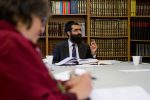Rabbi Binyomin Bitton (photo by Noam Dehan)
On Dec. 4, Chabad of Downtown Vancouver, led by Rabbi Binyomin Bitton, held a siyyum, a celebration to mark the conclusion of studying the entire book of Tanya, sometimes called “the Bible of Chassidic thought.”
The siyyum also celebrated Yud-Tes Kislev, the 19th day of the Jewish month of Kislev, which began this year on the evening of Dec. 6, and is known as “the New Year of Chassidism,” due to the release of the founder of Chabad and author of the Tanya, Rabbi Schneur Zalman of Liadi, known as the Alter Rebbe, from prison in czarist Russia on that date in 1798.
The Tanya is a guide to the pursuit of righteousness and the meaning of Jewish religious life from a Chabad Chassidic perspective. It is known for its counsel on how the intellect can transform the emotional life, and its teachings on how contemplating the nature of God and the soul can inspire and focus spiritual life. The Tanya also asserts that the height of the spiritual life lies paradoxically in the simple actions of human beings, and that the highest expression of God’s intention in creation is in the human doing of a mitzvah (religious commandment, good deed).
Bitton opened the siyyum by noting his pleasure that it happened to fall so close to Yud-Tes Kislev, when Jews all around the world start a new cycle of Tanya learning. He then welcomed Adina Ragetli, a descendant of the Alter Rebbe, to play the niggun (sacred wordless melody) of the Alter Rebbe, “Arba Bavos,” on the harp.
“We are all very happy tonight,” said Bitton afterwards, “except one person, whose name I won’t say, but I’ll tell you the letters of his name, Samech-Mem-Alef-Lamed [Samael, an evil angel, whose name is not spoken by Chassidim]. You know what the letters of his name stand for? Siyyum masechet lo aseh [the completion of a book you will not do].”
Rivka Arieli read the final section of Tanya with which they completed the book, and then the rabbi invited a series of students to speak of the meaning of the text to them. First to talk were Eduardo and Gabrielle Sonnino, who spoke of their discovery of the meaning of Judaism through the Tanya after coming to Canada from Brazil three years ago. They spoke humorously of their adoption of Jewish observance as a result, teasing Bitton that, in getting them to “leave their cheeseburgers,” he had ruined their lives.
Shirley Hirsch and her husband, Gabriel, had learned previously with Rabbi Lipa Dubrawsky, z”l, the educational director of Chabad-Lubavitch BC for 15 years until his passing in 2013. His wife, Dena Dubrawsky, urged the Hirsches to contact Bitton, and soon they were taking on Tanya every Monday. Hirsch spoke of the uniqueness of the Tanya in conveying the highest mystical truths of Judaism in a form that anyone can understand.
Robert Elias shared how the study of Tanya and its differentiation between the egoic and divine elements in the person had helped him improve his marriage, mend broken friendships, improve his relations with his co-workers, and remove the sense of ennui he was experiencing in his otherwise successful professional life.
Ragetli closed the celebration with another piece of music. Rabbi Yechiel Baitelman of Richmond Chabad also attended the siyyum.
Matthew Gindin is a freelance journalist, writer and lecturer. He writes regularly for the Forward and All That Is Interesting, and has been published in Religion Dispatches, Situate Magazine, Tikkun and elsewhere. He can be found on Medium and Twitter.

